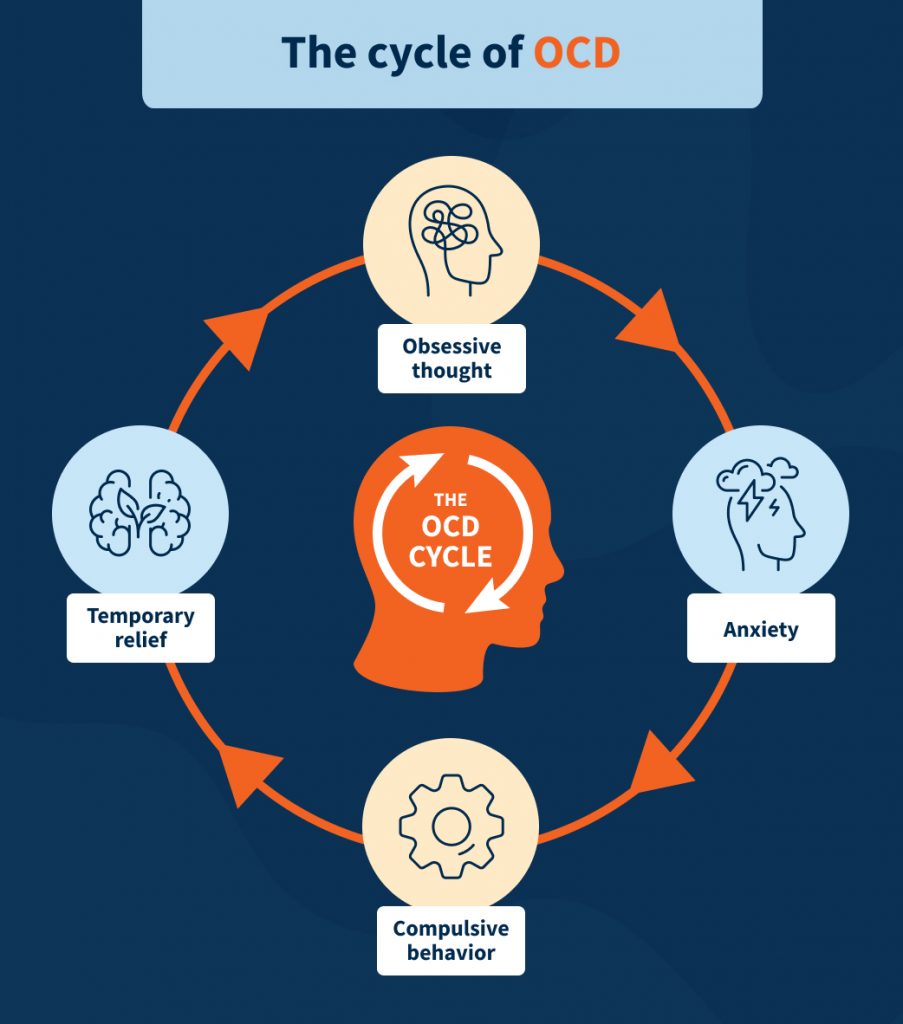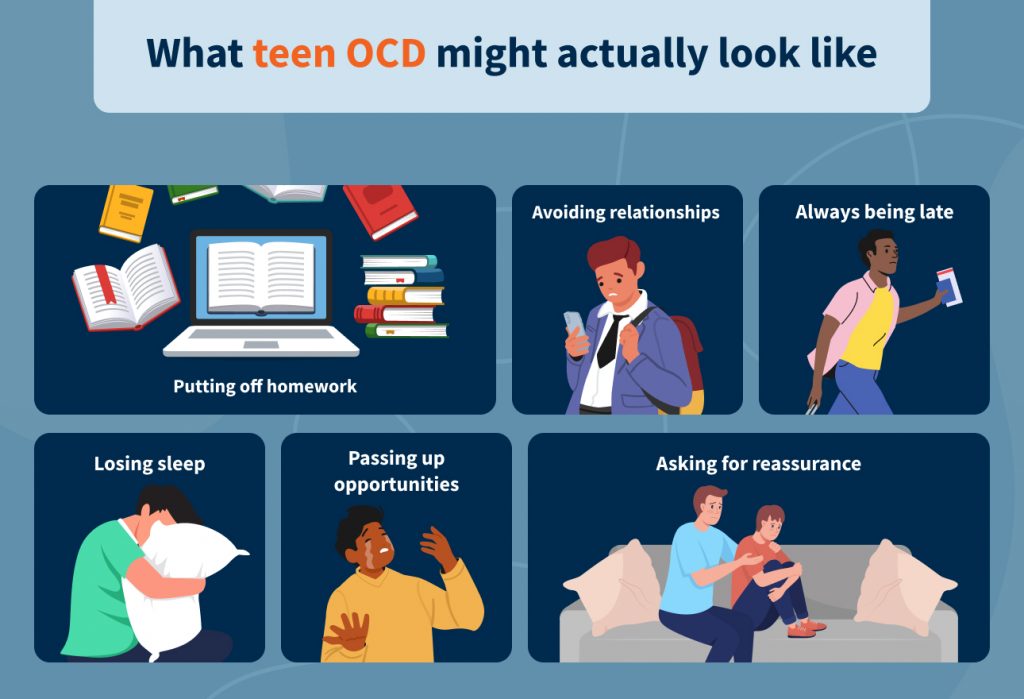Obsessive-compulsive disorder (OCD) can be debilitating for anyone living with it. At the very least, it gets in the way of living life without interruption. Intrusive thoughts become obsessive, which sometimes force compulsive behaviors. Knowing the facts about OCD can help you talk with your teen and find the right support if they need it.
What Is OCD?
OCD is a real issue that requires real attention. It’s a cycle of thoughts, mental images, or impulses that interrupt life and happiness.
Fact #1: OCD is a mental health condition.
It’s characterized by persistent, intrusive thoughts (obsessions) and/or repetitive behaviors (compulsions) that people feel compelled to perform. OCD causes a lot of stress to people who live with it.
How can OCD manifest in different ways?
OCD doesn’t usually look like its stereotype. It’s more than hand washing or organizing, and it’s more than what you’ve seen in the movies or on TV.
Fact #2: Intrusive thoughts can be about nearly anything.
People with OCD struggle with intrusive thoughts. They can be about nearly anything. Some of the most common include:
- Contamination
- Sexual acts
- Responsibility
- Sexual orientation
- Gender identity
- Religious beliefs (scrupulosity)
- Harming themselves or others
- Perfectionism
- Relationships
- Existence/death
- False memories
- Emotional contamination
Fact #3: Compulsions are to try and relieve stress.
Intrusive thoughts cause severe stress and, sometimes, shame and guilt. Compulsions are actions people take to try and lessen stress. While they might look like good habits at times, they more often get in the way and add to the stress. Common OCD compulsions include:
- Repeating intrusive thoughts (rumination)
- Doing things a certain number of times (i.e., sets of three)
- Checking and re-checking locks, switches, or the stove
- Excessive hand washing, showering, or cleaning
- Asking for reassurance
- Counting and/or ordering things
- Having a strict routine
How common is OCD in teens?
Your teen is not the only one who has OCD. In fact, rates of OCD and autism in youth are roughly the same across the globe.
Fact #4: OCD affects about 1 in 100 youth.
Even as common as OCD is among teens, the stigma surrounding mental health persists and makes it difficult to get help. Seeking help is not a sign of weakness or that something is inherently wrong. Treatment can help ease symptoms and lead to better outcomes.
When is OCD diagnosed?
People can live with unmanaged OCD for years without a diagnosis. The truth is, though, that symptoms interfere with daily life—especially during the transition to adulthood.
Fact #5: OCD is usually diagnosed in childhood, late teens, or early adulthood.
OCD often begins in childhood or adolescence, with most individuals showing symptoms by the age of 19. Early signs may include excessive hand washing, repeated checking, or a strong need for symmetry and order. Parents should be vigilant for these behaviors, especially if they interfere with daily activities.
Where do obsessive thoughts come from?
People with OCD aren’t “obsessed” in the same way someone might be “obsessed” with a new trend. Obsessions are intrusive, cause severe stress, and get in the way of someone living their life.
Fact #6: Obsessions can come from anywhere.
Obsessive thoughts can be triggered by people, places, or things—sometimes by nothing at all. Once they start, it can be hard to escape the cycle of thinking about them. People with OCD might fear they’ve already or will harm someone even if they never have any intention of acting on their obsessive thoughts. This can lead to shame and guilt, which can cause depression and even more anxiety.
Is OCD obvious?
Some people have noticeable stress and/or compulsions to try and ease that stress, but others don’t. Just because it might not be obvious doesn’t mean someone’s experience with OCD is any less valid.
Fact #7: Some people have no outward compulsions.
One common misconception about OCD is that it always involves both obsessive thoughts and obvious compulsive behaviors. However, some individuals experience the intrusive, obsessive thoughts and compulsive reasoning instead. Compulsive reasoning is another thought pattern, one that seems like a ping-pong match, trying to make sense of something.
Without the physical rituals to observe, compulsive reasoning can be challenging to recognize. Your teen, instead, might struggle with feelings of shame or guilt related to their thoughts, leading them to try and mask their symptoms or demand reassurance. Creating an open, non-judgmental environment at home can help your teen feel safe to discuss their thoughts.
What are the unique ways OCD can impact a teen’s daily life?
For teens, OCD can be more than a series of annoying habits; it can dominate their lives. They are still learning to navigate the world, and their OCD rituals might force them to take the long way around too often.
Fact #8: OCD gets in the way.
Rituals and stress interfere with schoolwork, extracurricular activities, relationships, and everything else. Teens with OCD might:
- Spend hours ensuring their books are perfectly arranged rather than doing homework.
- Avoid relationships because they’re afraid of harming someone.
- Always be late because they were checking the locks and stove.
- Consistently lose sleep worrying about something they said or because nighttime rituals are long.
- Pass up a chance to join a team because they feel like a burden.
- Constantly ask for reassurance or ask for help completing their rituals.
How does this condition connect to other mental health issues?
Obsessive thoughts and compulsive actions are just parts of someone’s overall mental health. Other areas, like mood and stress, are strongly impacted by OCD.
Fact #9: People with OCD are at higher risk of another mental health condition.
Many teens with OCD also struggle with other mental health issues, such as anxiety disorders, depression, or attention-deficit/hyperactivity disorder (ADHD). These co-occurring conditions can complicate the diagnosis and treatment, making comprehensive care even more essential.
When co-occurring mental health conditions are present, integrated treatment that addresses both disorders simultaneously is crucial for optimal outcomes. At Family First, our teen mental health programming incorporates evidence-based interventions for co-occurring conditions to provide comprehensive care.
Will teens with OCD struggle to lead daily lives?
As distressing as OCD is, people learn how to manage it. Your teen’s future doesn’t have to be limited because of their mental health; they just need help figuring out how to manage it.
Fact #10: OCD treatment can be effective.
A specific form of cognitive-behavioral therapy (CBT)—called exposure and response prevention (ERP)—is a particularly successful intervention for OCD. In fact, it has a 65–80% success rate when used for children and adolescents. Teens with severe OCD might be prescribed medication, which can be even more effective when used alongside ERP.
How is OCD treated?
OCD treatment for teens involves talk therapy. A type of antidepressant called serotonin reuptake inhibitors (SRIs) can be used for those who have moderate or severe symptoms.
Fact #11: ERP is first-line treatment for teens with OCD.
ERP helps teens break the cycle of OCD. Over time, they’ve learned that acting on their compulsions will, at least in the moment, reduce their stress. The problem is, as they take more time to act on their compulsions, they have less time for everything else, adding even more stress and guilt. ERP gives teens a safe space to recognize when they’re acting on compulsions, stop without acting, and allow their anxiety to ease on its own. Without guidance from a licensed therapist, this can be too daunting to do on their own and can lead to a relapse in symptoms.
Talking to your teen about their mental health
If your teen is diagnosed with OCD—especially if they are receiving treatment—supporting their journey can help them manage their symptoms. There is no “cure” for OCD, but it can be managed. Caving to every request or accommodating every obsession is not helpful. However, you can help them find healthy ways to cope and work toward recovery.
It’s also essential to have open and honest conversations with your teen about their mental health. Validate their experiences and feelings, encourage them to seek support, and educate yourself on OCD so that you can better understand what they are going through.
Is it time for treatment?
When you talk to your teen about their mental health, ask them about how it affects their daily life. Does it get in the way of their schoolwork? Their friendships? Even just getting ready in the morning or winding down at night? If so, it might be time to get help.
OCD can be managed, and Family First can help. Our OCD treatment for teens is designed to help our 12–18-year-old clients develop better ways to cope with their thoughts and manage their symptoms.
With more than 120 years of combined clinical experience and a compassionate, family-focused approach, we are dedicated to helping teens and their families navigate the challenges of mental health. Our specialized programming focuses on treating not just the symptoms but also the underlying causes of OCD. Contact us online today or at 888.904.5947 to find the support your teen and family need to move forward.



